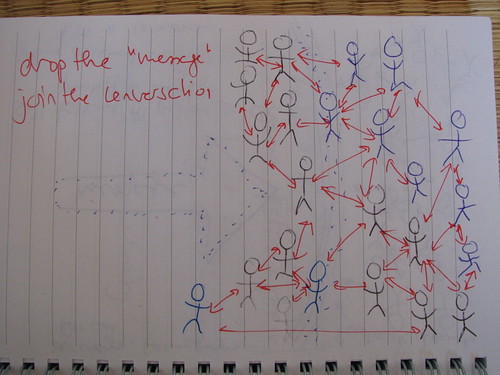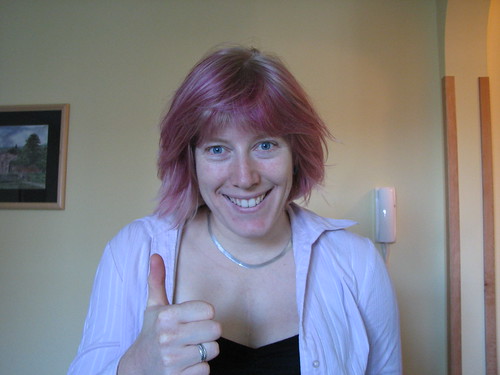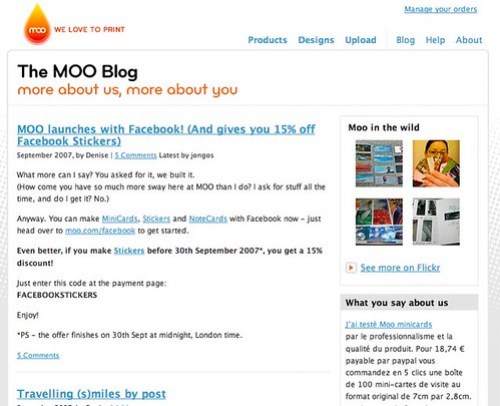[fr] Notes d'une conférence que je viens de donner en Serbie sur ce qu'est le travail d'une "consultante en blogs" (notez les guillemets). Je préfère en fait me définir comme une spécialiste de l'internet vivant (celui des dialogues et des relations humaines) et de sa culture. J'interviens partout où ce genre de connaissance est utile à mes clients.
Here are some rough notes of the talk I gave at Blogopen, reason of my presence in Novi Sad, Serbia. I hope they can be useful to some. Number between square brackets refer to slide numbers (presentation on Slideshare embedded below).
If you have notes of this talk or by any chance have recorded it, please leave a link in the comments.
update: yay! some short recording snippets. see the end of this post.
[1] [2] Two years ago I was a teacher, and if you had told me then that I would be here in Novi Sad, talking about what it is like to be a freelance blogging consultant, you would probably have seen me make a face like this:
[3] Later on I’ll tell you about what a “blogging consultant” like me actually does, but first of all, here’s my story. I grew up with computers in the house, discovered the internet in 1998 and soon after created a website. I started blogging in 2000 and gradually built a small reputation for myself online. By the time the Swiss media discovered blogs in 2004, I’d been at it for a while. When they started looking for Swiss blogs, they found me, and the phone started ringing.
You know how it is with the media: once one journalist has written about a person or a subject, all the others follow. I started giving interview after interview, exciting at first, but somewhat tedious after some time. But I was lucky to have very good local media coverage, which did help people find me or hear about me.
Just before the press started to show an interest in me (and blogs), a friend of mine asked if I could explain to her how to make a website. We sat together for two hours, and I told her how the internet was made of servers, and websites were in fact files that lived on those servers, files you can make in a text editor with special markings known as HTML, with CSS to control the visual aspect. She said “wow, you’re really good at this, you should get people to pay you to do it!” I was a bit skeptical, but thought it would be cool. So just before my first appearance on TV, I created a professional website (just a few pages, and if you look at it now, it’s really out-of-date — I’ll be working on it during the “Website ‘pro’ day” in a bit over a week). And on that website, I made a page saying something like “I’ll explain to you how to make a website, this is how much it’ll cost”.
Shortly after my TV appearance, I was contacted by a school who wanted me to come and talk about blogs to a class of teenagers. It went surprisingly well and I really enjoyed it, so I added an extra page on my professional site saying “I give talks in schools”. Little by little, through word of mouth mainly, I started having clients. And at one point about 18 months ago, I started having enough clients that I could consider quitting my day job (teaching).
That’s how I became a professional blogging consultant.
[4] So, what does a “blogging” consultant do? It’s not just about blogs. Actually, one of my ongoing struggles is to find a “job title” to define myself. “Blogging consultant” already existed, and people knew about blogs, so it wasn’t too bad.
[5] Blogging is more than it seems. It’s a tool, but it’s more than that. It’s also a culture, and if you’re a company or an institution, blogging is a communication strategy. We see companies and media corporations using the blog tool to publish press releases or official documentation. That’s using the tool, but they don’t get the culture, and they haven’t changed their strategy. (You might want to see the notes on my talk “How Blogging Brings Dialogue to Corporate Communications” if this topic interests you.)
[6] One expression we hear a lot in this kind of context is “social media”. Traditional media go in one direction. Journalists write, people listen (or put their fingers in their ears). It looks like this:
With social media, on the other hand, we have a new type of media (well, reasonably new) where conversations take place. Communication goes both ways:
So basically, being a “blogging” consultant has a lot to do with social media. (Understanding and explaining it.)
[7] All this kind of stuff is explained in a great book that everybody should read: The Cluetrain Manifesto. You can read it for free on the Internet or buy it as a real book if you prefer. The Cluetrain Manifesto was written in the year 2000, so quite some time ago, but it’s still spot on. It tells us how people are sick of being marketed at and talked at, and how people are already having conversations everywhere about brands, companies, and these conversations are happening on the internet. Companies, politicians, and media empires would be smart to step in and join the conversation. Anyway… read the Cluetrain Manifesto if you have any interest in what’s going on on the Internet.
[8] So, in my job, I don’t just work with blogs. In addition to blogs, sometimes solution require wikis, podcasts, or social networks. [9] Using these tools brings up values like dialogue, transparency, authenticity, and often leads to rethink strategy. [10] Finding a solution for a client can be helping them re-organise their e-mail, set up a mailing-list, or simply build a website. Maybe it requires social tools like Twitter or Dopplr, or they might even want to know about virtual worlds like Second Life.
This is clearly not just about “blogging”. It’s about this bigger world blogging is an important part of.
[11] I like to think of myself as a specialist of the living web and its culture. The living web is the internet of people, conversations, and relationships.
My work is anywhere people need this kind of knowledge. Who needs this kind of knowledge?
[12] Schools, politicians, companies big and small, freelancers, non-profits, media, startups, people…
[13] Here’s a little more about what it means to be a freelancer consultant in today’s world.
[14] The Balance of the Soloist according to Stowe Boyd:
The most difficult challenge for soloists is to find a balance between the various activities that must take place to survive. I like to oversimplify these down to three:
- Doing The Work — The heart of consulting — of whatever description — is delivering the work. A soloist has to deliver value to the client in order to make money. Most consulting-oriented people start with this capability: it’s the other two that cause problems, in general.
- Marketing and Networking — I have already noted that I principally market myself through blogging, and that I attend conferences: those are the outward signs of a willingness, or even an obsession with networking with likeminded others. When I find out about a web product that sounds interesting (my beat), I sign up for the beta, fool with it, write a review, ask for more info, and very soon I am involved in a direct communication with the company’s management. I read other people’s blogs and comment on their ideas. When attending conferences I try to chat with both old friends and folks I have never met before. I know many consultants whose natural introversion makes such activities difficult if not impossible. But these interactions are just as critical to being a soloist as performing the work, and are likely to take up just as much time!
- Prospecting, Contracts and Cash Flow — I am always happy to talk about money, and as a soloist it is imperative to get what you are worth, and then to collect the fees. This is a blind spot for many, and a make-it-or-break-it issue. I know a lot of folks that find it hard — even with people they know well — to ask for a project, an engagement, whatever, and to demand payment later on. It may seem obvious but many consultants only get involved with this as a necessary evil, but it’s not. It’s just as central as delivering the goods and networking.
Stowe Boyd, “Going Solo: A Few Words Of Advice”
These are the three skills the freelancer needs. Often people drawn towards freelancing are people who are good at doing something (the work) and reasonable networkers — and the third part (money) is the most difficult.
[15] the work
This will of course vary from person to person. Depending on your skills and abilities, you will be doing different things. For example:
- talking (like this talk I gave — speaking engagements)
- explaining — talking with clients to tell them about things they need to understand
- solving problems
- gathering information (about your client, about a subject you need to know more about)
- managing projects
- installing tools (WordPress, wikis…)
- coding HTML, CSS, or even PHP
- doing graphical design in Photoshop (I don’t do this, I’m really bad at it, so I usually tell the client he needs to have somebody else for this)
- training — it’s not that easy for “normal people” to learn how to use a blog tool… and more importantly, understand the blogging culture. Linking can be the topic of a two-hour class! (what to link, when, with what text, trackbacks, linking technique… suddenly text has two dimensions instead of one, so it changes writing style…)
- “cluetrain 101” — explaining the basics of what the internet is changing to the way we communicate
- experiential marketing (I’ll blog more about this later) — where you use a client’s product and blog about it
- blogging for a client (even though it’s not something I believe in, and I don’t do it — some people might)
[16] Marketing
- blog, blog, blog. And blog more. Demonstrate your expertise. Look at how Thomas Mahon used his blog to demonstrate his expertise at being a high-class tailor. Blog about what you know and what you’re doing.
- be a good connected net citizen. Use LinkedIn, Facebook, twitter, IM… be out there
- talk around you offline
- go to events — try to speak! send in proposals! Barcamps are a great place to start because anybody can talk. Get somebody to film you and put it online. If you’re not speaking, publish live notes of the talks on your blog (live-blog). People who weren’t there or didn’t take notes might appreciate yours.
- in short, take care of your social capital (whuffie) — your social connections
- if you’re lucky enough to have journalists call you — be nice with them. I would probably not be here today if it hadn’t been for the local press in Switzerland.
[17] Cash
Often a difficult point, as I mentioned.
- how do you actually get to the point where you close a deal?
- contracts
- you’re worth more than you think! Have friends help you keep that in mind before you negotiate with clients.
- will you be paid per day, per project?
- how much? fixing the right price can be tough — I haven’t completely figured out pricing yet.
- when do you ask for money, when do you not ask? Sometimes it’s not that obvious.
In addition to this, going freelance might mean you have to think about:
- insurance
- taxes
- laws
- accounting
- invoicing
And also… balancing your personal and professional life. All this “taking care of your social capital” does tend to blend the two — in a good way, often, but also in a way that makes taking days off or going on a real holiday very difficult. Pay attention to that.
[18]-[23] So, looking back… After my initial “no way!” reaction to the idea of being a “blogging consultant” two years ago, even though I went through phases like this
and this
and this
and even
overall… I’m pretty happy about my life as a blogging consultant:
note: I took all the rather cheesy “emotion” photos myself the morning before the talk, because I didn’t have the time and resources to go hunting for good “emotional faces” stock photography… I hope you’ll forgive me!
You can find more stuff about consulting in my del.icio.us links.
Thanks to everybody who attended my talk and gave me kind feedback. Many Serbian bloggers also mentioned my talk in their blog posts, but I’m afraid I can’t understand any of it! Here are the links, though:
- Borska internet organizacija | BITNO na BlogOpen-u / 2
- Blogopen utisci
- BlogOpen & Novi Sad – dan posle | O zivotu, Vaseljeni i svemu ostalom
- BlogOpen – Elektro kuhinja – Blog.hr
- » Blog Archive » Susret na Blog Open-u
- Nemanja Srećković » Blog Archive » Utisci sa BlogOpen-a 2007
- BlogOpen Review
- Uh kakva subota! at Samo malo
- BlogOpen u Novom Sadu – total report | Webmasterov blog
- BlogOpen utisci | Dragan Varagic Weblog
- BlogOpen weekend
- Blog Open…i kako ga pregurati
As far as I can tell, some posts simply mention me. But if there’s anything said worth to be translated or paraphrased, feel free to do so in the comments! (Just tell me what link it’s about…)
Update:
Thanks a lot to darko156 who filmed two short video sequences and uploaded them to YouTube. Here they are. The first video is slides [4]-[7] (what exactly a blogging consultant is, social media, The Cluetrain Manifesto):
The second is slides [7]-[10] (Cluetrain, social media tools and values — dialogue, transparency, authenticity, strategy…):
Curious about what I was waving in my right hand?


































